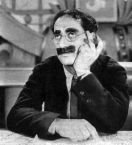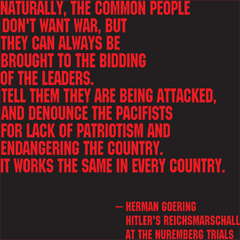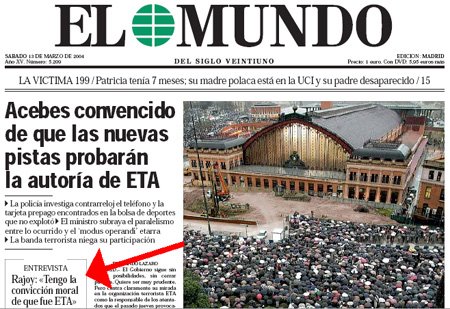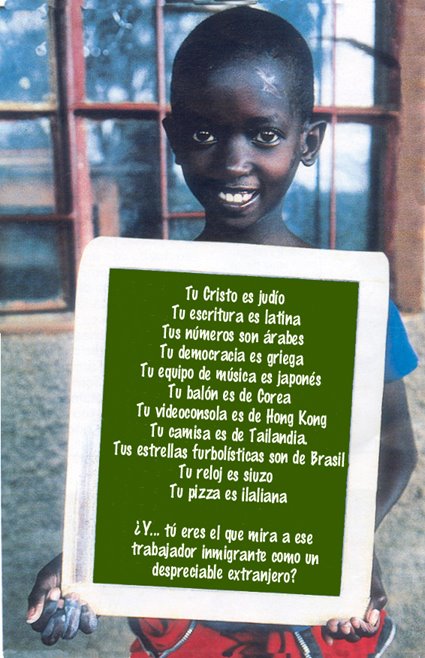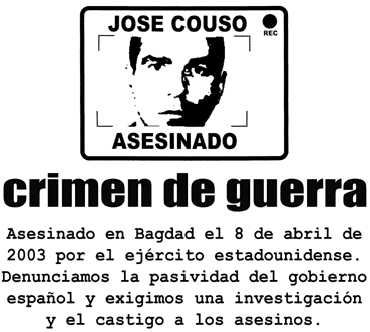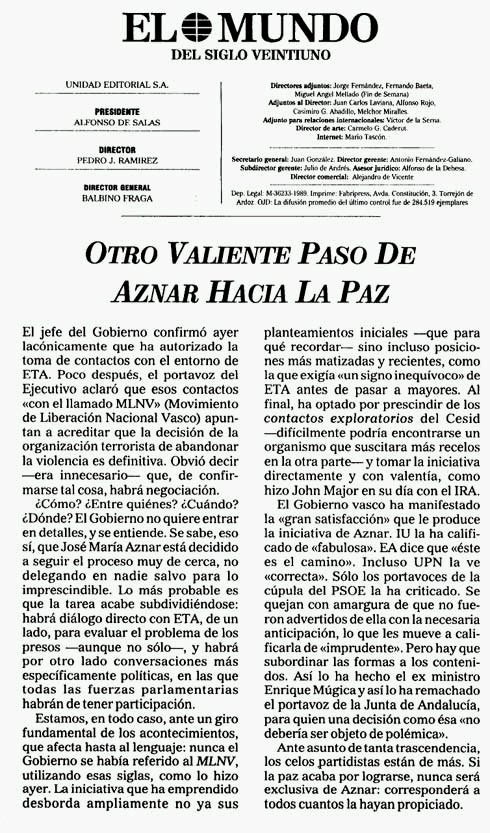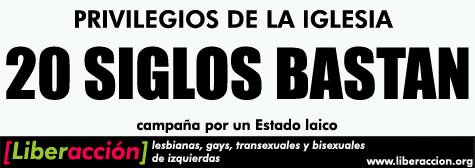 Reproduzco por su interés el artículo publicado por Natalia Junquera en El País EL 22/09/07
Reproduzco por su interés el artículo publicado por Natalia Junquera en El País EL 22/09/07 José Couso estaba en el hotel Palestina la mañana que murió alcanzado por un misil estadounidense porque le habían dicho que salir de él era peligroso. Aquel 8 de abril de 2003, EE UU avanzaba sobre Bagdad y la capital se convirtió en un inmenso campo de batalla. El resto de los periodistas que se alojaban en el Palestina -casi toda la prensa que se había desplazado a Irak a cubrir el conflicto, unos 300 periodistas- habían hecho lo mismo y permanecían en sus habitaciones, para protegerse. Couso trabajaba aquella mañana desde la terraza de la suya, la 1.403, cuando fue alcanzado por el misil del carro de combate al que él había estado grabando durante varias horas. Murió en el hospital después de que los médicos intentaran salvarle amputándole una pierna.
"Parece una pelea imposible. Pero, aunque el empeño me lleve el
resto de mi vida, no lo dejaré", dice su viuda.
"¿Has hecho un jodido disparo al hotel Palestina?", gritó el teniente
coronel De Camp al capitán Wolford. Couso, de 37 años, con dos hijos, era el tercer periodista que perdía la vida por fuego estadounidense aquella mañana en Bagdad. Taras Protsyuk, un reportero ucranio de la agencia Reuters, que grababa desde la habitación 1.502, murió en la puerta de urgencias del hospital, a cinco minutos del hotel Palestina. Horas antes, dos bombas lanzadas desde un avión del ejército estadounidense sobre la sede de Al Yazira habían fulminado al periodista jordano Tarek Ayub.
"A las pocas horas de la muerte de mi hermano ya sabíamos que había sido un ataque premeditado. La teoría del accidente, de la mala suerte, duró muy poco tiempo. Hasta que supimos que esa misma mañana los estadounidenses habían atacado las sedes de las televisiones de Al Yazira y Abu Dhabi y hasta que vimos las cintas. Las cintas que grabaron periodistas alojados en el hotel en las que se veía cómo el carro de combate llevaba cinco horas parado a un kilómetro y medio y 35 minutos sin recibir ningún disparo", explica Javier, uno de los hermanos de Couso. "Querían intimidar a la prensa. Sabían perfectamente que los periodistas estaban en el Palestina y, por supuesto, en la sede de Al Yazira, que había facilitado al Pentágono sus coordenadas dos meses antes".
En su primera versión sobre lo ocurrido, el mismo 8 de abril de 2003, EE UU comunica al Gobierno español que el hotel Palestina había sido declarado "objetivo militar" 48 horas antes y que así se lo habían comunicado a los periodistas. "Es mentira. José era muy prudente. Precisamente me había contado que habían tenido que cambiarse de hotel, del Rashid al Palestina, porque el Pentágono les había dicho que el Rashid podía ser objetivo militar", asegura Lola Jiménez, viuda de José Couso. "Fue un crimen de guerra, un asesinato. Desde el primer momento estuvo clarísimo".
El 1 de mayo de 2003, el entonces secretario de Estado norteamericano, Colin Powell, admitía en una visita oficial a España que los soldados sabían que el Palestina era el hotel de los periodistas, lo que contradecía las primeras declaraciones del sargento Thomas Gibson, autor del disparo: "Si lo hubiésemos sabido, no habríamos disparado", había asegurado. Un par de semanas después, la familia de Couso presentó una querella criminal por crimen de guerra y asesinato contra los responsables del ataque: Gibson y sus superiores, el capitán Philip Wolford, que dio la orden de disparar, y el teniente coronel Philip de Camp, a quien los periodistas empotrados en las filas de EE UU escucharon cómo gritaba por la radio a Wolford: "¿Has hecho un jodido disparo contra el hotel Palestina?".
El 12 de agosto llegó la tercera versión. "Un folio. El Pentágono decía que había disparado en defensa propia, lo cual es absurdo teniendo en cuenta, por ejemplo, el principio de proporcionalidad del derecho humanitario. "En caso de que hubiera habido un francotirador, poco podía haber hecho contra un carro de combate", señala Javier Couso. "Tenemos un familiar militar que nos ha explicado que, a la distancia a la que estaba el carro de combate del hotel, el visor del Abrams es capaz de ver hasta los rostros de las personas que podían estar en la terraza, y, por supuesto, distinguir una cámara de televisión de unos binoculares de francotirador", afirma la viuda de Couso.
Durante estos cuatro años de proceso, los Couso se han familiarizado con términos de los que jamás habían oído hablar y que nunca les interesaron hasta la muerte de su ser querido. Javier Couso confiesa haber leído "decenas y decenas" de libros sobre guerras y periodistas, además de todos los tratados, reglas y convenios existentes sobre la combinación de esos dos elementos: periodismo y conflicto. "También leo unas cinco revistas militares al mes. Siempre estoy leyendo algo sobre el tema. No he dejado de pensar en mi hermano ni un solo día desde que lo mataron. He visto las cintas decenas de veces, y cada vez que las veo me pongo malo". Han aprendido jerga judicial o militar pero siguen intentando acostumbrarse a los altibajos de un proceso judicial que dura ya cuatro años y cinco meses. "Te llevas una alegría e, inmediatamente después, una gran decepción. El juez dicta una orden de busca y captura contra los tres militares responsables del ataque y el fiscal la recurre. Psicológicamente es algo destructivo", explica Lola Jiménez. "Con todas las pruebas que hay piensas que debería ser algo sencillo, pero al final es una familia contra el país más poderoso del mundo", añade Javier Couso.
El juez de la Audiencia Nacional Santiago Pedraz reactivó el pasado 16 de enero la orden de busca y captura y detención internacional a efectos de extradición de Gibson, Wolford y De Camp, después de que la Audiencia Nacional la dejara sin efecto al archivar el caso por considerarlo "un acto de guerra contra un enemigo erróneamente identificado". La familia Couso recurrió y ganó ante el Supremo, pero la Fiscalía de la Audiencia Nacional solicitó de nuevo a finales de mayo el archivo de la causa. "La querella es por un crimen de guerra y los crímenes de guerra no prescriben. Para nosotros, lo más importante es que el caso siga vivo. Sabemos que es difícil pero el hecho de que los militares implicados ya no puedan salir de su país es un pequeño triunfo", afirma Javier Couso. "Yo nunca he visto tres militares del otro lado. Veo un muro infranqueable, una pelea imposible", dice Lola Jiménez. "Pero no pierdo la esperanza. Creo que al final conseguiremos que haya un juicio y que se depuren responsabilidades.
Aunque el empeño me lleve el resto de mi vida, no lo dejaré. Jose se lo merece".
A family against the most powerful country in the world. Published by Natalia Junquera. El País, 22/09/07
English version. Translated by Victor
Jose Couso was at the Palestine Hotel the morning he died hit by an American missile because he was told it was too dangerous to leave it. That April 8th of 2003, the USA army marched into Baghdad and the capital became a battlefield. The others journalist who stayed in the Palestine Hotel, almost all the media that went to Iraq to cover the conflict, nearly 300, had done the same and stayed in their rooms, to take cover. Couso was working that morning from the balcony of his room, number 1403, when he was hit by a missile fired by a tank he had been videotaping for several hours. He died in the hospital after the doctor tried to save his life by amputating his leg
“It looks like an impossible fight. But, although it takes me the rest of my life, I won’t give up”, says his widow
.
“Have you taken a fucking shot at the Palestine Hotel?”, yelled
Lieutenant Colonel De Camp to captain Wolford.
Couso, was 37 years old and had two children. He was the third journalist who lost his life due to American fire that morning in Baghdad. Taras Prostsyuk, an Ukrainian journalist who worked for the Reuters Agency, and was videotaping from room 1502, died at the entrance of the hospital, located just five minutes from the Palestine Hotel. A few hours before, two bombs dropped by an American airplane over the Al Jazeera headquarters, had killed Tarek Ayub, a Jordanian journalist. “ within a few hours after my brother died , we already knew that it had been a premeditated attack. The accident theory, or just bad luck, didn’t last long. Just until the moment we knew that the very same morning, the Americans had attacked the Al Jazeera and Abu Dhabi television stations and we saw the tapes. The tapes that were recorded by journalists who were staying in the hotel in which one could see how a tank had been stationary for about five hours and without receiving a single shoot for thirty five minutes”, explains Javier, one of Couso´s brothers. “They wanted to intimidate the media. They knew perfectly well that journalists were in the Palestine Hotel and, of course, in the Al Yazira Headquarters, which had informed the Pentagon of its location two months earlier”.
The first version of what had happened came the 8th of April when the USA tells the Spanish Government that the Palestine Hotel had been declared a “military target” 48 hours before the attack and the journalists had been informed. “That’s a lie! José was very cautious. In fact, he had told me that they had to move to another hotel, from the Rashid to The Palestine, because the Pentagon told them that the Rashid Hotel could be a military target”, says Lola Jiménez, José Couso´s widow. “It was a war crime, an assassination. It was clear from the first moment”.
On May 1st of 2003, former Secretary of State, Colin Powell, admitted in an official visit to Spain that the soldiers knew that the Palestine Hotel was where the journalists stayed, contradicting the first statement made by Sergeant Thomas Gibson, the shooter: “if we had known, we wouldn’t have shot”, he said. A couple of weeks later, Couso´s family filed criminal charges of war crime and assassination against the persons responsible: Gibson and his superiors, Captain Philip Wolford, who gave the order to open fire and Lieutenant Colonel Philip de Camp, the one who was heard by the journalists yelling over the radio to Wolford: “Have you taken a fucking shot at the Palestine Hotel?”
On August 12, there was a third version. Just one page. The Pentagon said that it had shot in self-defense, which is absurd, keeping in mind, for example, the principle of proportionality of the humanitarian law. “If there had been a sniper, he couldn’t have done much against a tank”, says Javier Couso. “ We have a relative who is in the army and he explained to us that at the distance of the tank to the hotel, the Abrams sight is able to see even the faces of the people who were on the balcony, and, of course, to distinguish a television camera from a sniper’s binoculars”
In these four years, the Couso´s family have familiarized themselves with terms they had never heard before or taken an interest in until the death of their relative. Javier Couso confessed to have read “dozens and dozens “ of books about wars and journalists , as well as all the treaties, rules and agreements that exist about the combination of both: war and journalism. “ I also read about 5 military magazines every month. I am always reading about this issue. I haven’t stopped thinking about my brother for a single day since he was killed. I have seen the tapes dozens of times and every time I watch them I feel sick”.They have learnt judicial or military jargon, but they keep trying to get used to the ups and downs of a judicial process that has already lasted four years and five months. “One day you receive good news and immediately you have a big disappointment . The judge orders the arrest of the three military officers responsible for the attack and the District Attorney appeals. It is Psychologically destructive”, says Lola Jiménez. “with all the evidences one thinks that it should be easy, but at the end it is a family against the most powerful country in the world” adds Javier Couso.
On January 16th of 2007 the Judge from the Audiencia Nacional Santiago Pedraz, revived the order of arrest and international capture pending extradition of Gibson, Wolford and De Camps, after the same Audiencia Nacional voided it by considering it “an act of war against an enemy mistakenly identified”. The Couso´s family appealed to the Spanish Supreme Court and won, but the Audiencia Nacional District Attorney requested the withdrawal of the charges. “The charges are war crimes and they never expire. To us, the most important thing is that the case is still alive. We know that it is difficult, but just the fact that now the military officers involved can’t leave their country , is a small victory”, says Javier Couso. “I have never seen the other side as three military officers. I see an unbreachable wall, an impossible fight”, says Lola Jiménez. “But I always have hope. I believe that at the end we’ll get a trial and someone will be held responsible. Although it takes me all my life, I won’t give up. José deserves it”.
Cuarto aniversario de la muerte de Couso






